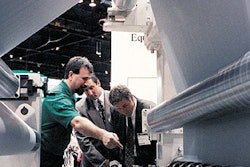A clean-looking package and colorful logo lend eye-appeal and shelf impact to GlaxoSmithKline (GSK) Consumer Healthcares new alli OTC weight-loss package. Yet, one of the most interesting packaging aspects is the collation of a group of booklets within the alli starter pack. (See the sidebar story for a list of starter-pack components.)
GSK Consumer Healthcare launched alli in June. Its sold at pharmacies, grocery stores, and mass merchandisers nationwide. The introduction followed the Food and Drug Administrations approval of alli as a nonprescription weight-loss aid. Orlistat, the active drug ingredient in alli, is a reversible lipase inhibitor that acts by inhibiting the absorption of dietary fats. Alli is available to adults aged 18 or over and is designed to work in conjunction with diet and exercise.
Once a consumer has purchased alli, he or she can visit www.myalli.com to gain access to GSK Consumer Healthcares myalliplan, which the company promotes as the centerpiece of the alli program. The Web site allows consumers 24/7 access to a customized online action plan, recipes, record-keeping, and personalized e-mails that deliver messages about meal planning, managing hunger, dealing with setbacks, etc. Using the seven reference booklets described in the sidebar story, dieters can track their progress and get more weight-loss management information. The pack of seven booklets measures 3 x 5 and is about 1-thick.
The booklets are collated and banded together by a GSK vendor company that preferred not to be identified in this story. Collation is done on collating lines custom-manufactured by Eastern Automation. The approximately 40-long lines feature specialty conveyors from Dorner Manufacturing that were sourced through distributor Wenco Machinery. Each of the three lines is equipped with seven bar-code readers from Keyence.
that serve to verify that each of the seven bar-coded booklets is in place during collation and assembly.
The Dorner 3200 Series conveyors are built so well that we just added legs and built our machines around them, says Scott Bellows, president of Eastern Automation, a builder of custom automation equipment for packaging, assembly, and inspection applications for a variety of industries.
We had to make a machine that would guarantee that the booklet package would contain all seven booklets, and be the correct versions. We did that by using the Keyence laser bar-code readers, recalls Bellows. The beauty of it is that Dorners conveyor has cleats, or moving pockets.They weld these cleats on any pitch that you want. For this application, the cleats are welded approximately 100 millimeters apart from each other. Each of these cleats accommodates one alli booklet.
The cleated conveyors (see photos above) and service earned Bellows appreciation of the Dorner machinery, but it was turnaround time that left a sterling impression in his mind. Bellows explains that while this customized collating line took almost six months to manufacture, the delivery for the custom cleat conveyor from Dorner was two weeks. Dorners competition quoted the same spec conveyor with a fourteen-week delivery time!



















